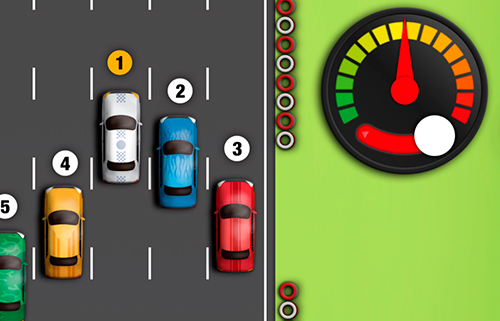
Multi-platform
Dragster Racing: Brain Game
Cognitive training brain game
Play "Dragster racing" online and boost your cognitive abilities
Get access to this scientific brain training resource
Challenge your brain
Dragster Racing is an online brain training game . In order to advance through the levels of this game, the user will have to get to cross the finish line first, speeding as fast as possible and braking in time to stop. As you progress through the levels, you'll be using more parts of your brain and the cognitive challenge will be even greater.
As you advance and help improve your cognitive skills trained in this online brain game, it will advance with you. Dragster Racing is a scientific resource designed to constantly measure performance and automatically regulate the difficulty to ensure that the user is getting the most out of each training session. The mind game Dragster Racing is appropriate for children and adults and can help improve essential cognitive skills.
How can the brain game "Dragster Racing" improve your cognitive abilities?
This brain game can be played by anyone looking to test and improve their cognitive performance. Training with brain games like Dragster Racing stimulates specific neural patterns. The repetition of this pattern through consistent training can help improve the creation of new synapses and neural circuits capable of reorganizing and recovering damaged or weakened cognitive functions
1st WEEK
2nd WEEK
3rd WEEK

Neural Connections CogniFit
Which cognitive skills can you train with the online brain game "Dragster Racing"?
The cognitive skills that this game trains are:
- Estimation: The user will have to calculate the distance to the finish line and pressing the space bar quickly in order to stop the car at the right time. Estimation is a cognitive skill that we use in our daily lives, like when you have to slow down at a stoplight or pass another car in the freeway. Improving estimation may be able to help improve other daily activities.
- Response time: This mind game has been designed so that the user has to press the start button as soon as the traffic light changes. By doing this, the user is training reaction time. Training reaction time may make you more efficient and make it possible to react faster in situations of your daily life that require detecting, processing and responding to a stimulus. For example, when you are driving and a pedestrian suddenly crosses the street.
- Updating: It's easy to make mistakes while playing Dragster Racing, be it pressing the start button early or too late. That is why it's important to know what mistake you are making in order to correct it in the following race. This brain game will use our updating cognitive ability. Updating makes it possible to quickly and efficiently detect and correct spelling mistakes.
Other relevant cognitive skills are:
- Spatial perception: This cognitive skill is essential when you want to know how far is the finish line and if you are going to crash or not. Practicing this game will stimulate and activate spatial perception, and improving this cognitive skill can make it easier to properly respond to the necessities of daily life like properly placing bricks at a construction.
- Shifting: The same way it's easy to make mistakes, it's important that we correct them. This brain game was designed to help the user constantly correct and modify our execution of the task. Practicing this cognitive skill can help train shifting. Improving this cognitive skills can help us adapt our thinking to new, changing, or unexpected circumstances.
What happens when you don't train your cognitive abilities?
Our brains are designed to save resources and be as efficient as possible, which is why it erases the connections that aren't being used. This is why if a certain cognitive skill isn't used frequently, the brain doesn't supply it with the resources it needs, and it becomes weaker and weaker. This makes us less able to use the weakened cognitive skill, making us less efficient in activities in our daily lives.



